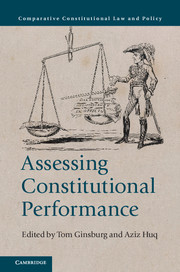Book contents
- Frontmatter
- Contents
- List of figures
- List of tables
- List of contributors
- Acknowledgments
- INTRODUCTION
- PART I DEFINING CONSTITUTIONAL PERFORMANCE
- PART II MANAGING SPECIFIC CONSTITUTIONAL CHALLENGES
- 6 Constitutional performance in transitions from military to civilian rule
- 7 Constitutional permissiveness, constitutional restrictiveness, and religious freedom
- 8 Performance of constitutions: Transitional provisions
- 9 Time and constitutional efficacy
- 10 Competitive democracy and the constitutional minimum core
- PART III CASE STUDIES
- Index
- References
6 - Constitutional performance in transitions from military to civilian rule
from PART II - MANAGING SPECIFIC CONSTITUTIONAL CHALLENGES
Published online by Cambridge University Press: 05 August 2016
- Frontmatter
- Contents
- List of figures
- List of tables
- List of contributors
- Acknowledgments
- INTRODUCTION
- PART I DEFINING CONSTITUTIONAL PERFORMANCE
- PART II MANAGING SPECIFIC CONSTITUTIONAL CHALLENGES
- 6 Constitutional performance in transitions from military to civilian rule
- 7 Constitutional permissiveness, constitutional restrictiveness, and religious freedom
- 8 Performance of constitutions: Transitional provisions
- 9 Time and constitutional efficacy
- 10 Competitive democracy and the constitutional minimum core
- PART III CASE STUDIES
- Index
- References
Summary
In the late 1990s, former Turkish president and prime minister Suleyman Demirel was asked to comment on an ongoing crisis between the civilian and military leadership in his coup-prone country. Demirel replied with a joke. There was an experiment in an English zoo, he explained, to place lambs and wolves in one cage in order to teach them how to live together. The zoo director was asked if the experiment was working. The director replied: “Yes, but from time to time, we have to replace the lambs.”
A transition from military to civilian rule often forces military and civilian leaders to live together as wolves and lambs in one cage for a period of time. Among other things, they must agree on a framework for the transition, which often, but not always, includes the amendment or replacement of the existing Constitution to govern the new civilian regime. During the constitutional-design process, the military often attempts to entrench into the revised Constitution provisions that protect its institutional autonomy and perpetuate its influence in civilian governance.
Constitutional entrenchment of the military's prerogatives creates a wealth of theoretical and empirical questions about constitutional performance. Depending on context, constitutional entrenchment can be a reliable method of protecting the autonomy and privileges of the military and its civilian allies, at least in the short term. Even from the perspective of other relevant actors, entrenchment may be a second-best outcome. Although immediate and complete ouster of the military from domestic politics may be possible in some transitions, in others, any attempts to swiftly force the military back to the barracks can prompt a backlash from the military, which might dig in, rather than give in, and derail the transition process. And in some cases, some level of military involvement may be desired in the initial stages of the transition so that the military can maintain stability and act as an arbiter of constitutional bargains between competing political groups.
Entrenchment of the military's prerogatives, however, can also undermine long-term democratic development. As a result of entrenchment, the military may emerge as a de facto, if not de jure, separate branch of government from the transition process. For democracy to persist, the military must ultimately retreat to the barracks and become subordinate to democratically elected civilian leaders.
- Type
- Chapter
- Information
- Assessing Constitutional Performance , pp. 145 - 170Publisher: Cambridge University PressPrint publication year: 2016
References
- 1
- Cited by



